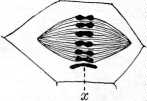


Lilian Al-Chueyr Pereira Martins
Artigo publicado em: História, Ciências, Saúde – Manguinhos 6 (2): 235-56, 1999.
Resumo: Este artigo estuda algumas das contribuições apresentadas na etapa inicial do estabelecimento da teoria cromossômica com relação à determinação do sexo, focalizando principalmente a hipótese de McClung. Esta relacionava o cromossomo acessório (X) à determinação do sexo masculino. São analisados os argumentos empregados por McClung, outras alternativas bem como as reações da comunidade científica da época. Conclui-se que, apesar de equivocada, a hipótese de McClung motivou uma série de pesquisas que no decorrer do tempo levaram ao esclarecimento da questão. Mesmo hipóteses equivocadas, quando adotadas como sendo algo a ser investigado e testado, podem ser úteis para o desenvolvimento científico.
   |
Paper published in: História, Ciências, Saúde – Manguinhos 6 (2): 235-56, 1999.
Abstract: This paper studies some early contributions related to sex determination in the first stage of the establishment of chromosome theory. Its main subject is McClung's hypothesis that associated the accessory chromosome (X) to the determination of the male sex. The arguments presented by McClung and other alternatives, as well as the reaction of the scientific community, are analyzed. It is concluded that although mistaken, McClung's hypothesis motivated a series of researches that finally lead to the elucidation of the question. Moreover, even wrong hypotheses may be useful for scientific development when adopted as something to be tested and investigated.